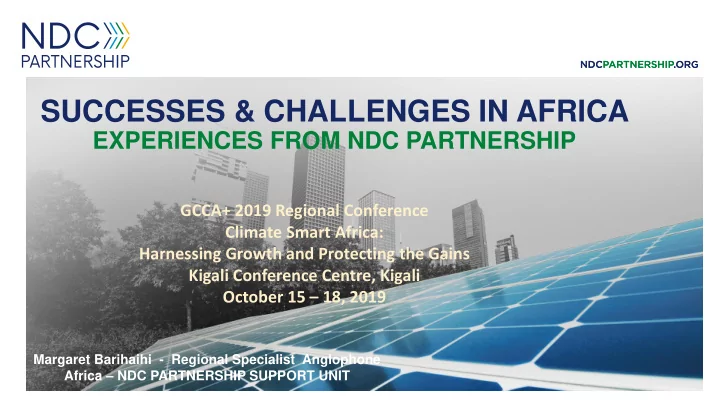

SUCCESSES & CHALLENGES IN AFRICA EXPERIENCES FROM NDC PARTNERSHIP GCCA+ 2019 Regional Conference Climate Smart Africa: Harnessing Growth and Protecting the Gains Kigali Conference Centre, Kigali October 15 – 18, 2019 Margaret Barihaihi - Regional Specialist Anglophone Africa – NDC PARTNERSHIP SUPPORT UNIT
PRESENTATION OUTLINE • What the NDC Partnership is • How we work • Insights on Successes and Challenges regarding NDC implementation in Africa 2 Presentation info in footer | 21/10/2019
3 October 21, 2019
GOVERNANCE Co-Chairs Costa Rica Minister Rodriguez Netherlands Minister Kaag Steering Committee Denmark France Germany Japan Morocco Republic of Sweden Uganda Viet Nam Marshall Islands Ex Officio members as hosts of the Support Unit 4
MEMBERS 103 Countries 5
MEMBERS 32 International Institutions 6
MEMBERS 19 Associate Members 7
ACTIVE ENGAGEMENT 50 Countries Africa 1. Uganda 2. Kenya 3. Rwanda 4. Namibia 5. Mozambique 6. Ethiopia 7. Zimbabwe 8. Nigeria 9. Sudan 10. Mali 11. Burkina Faso 12. Sao Tome and Principe 13. Tunisia 14. Senegal 15. Côte d’Ivoire 16. Gabon 17. Morocco 18. Republic of Congo 19. Seychelles 8
BACKGROUND ON THE NDC PARTNERSHIP: COUNTRY DRIVEN SUPPORT
NDC PARTNERSHIP IN AFRICA Focus of requests for support Countries: Cote D’Ivoire, Kenya, Mali, Mozambique, Namibia, Rwanda, Seychelles, and Uganda . 10
NDC PARTNERSHIP IN AFRICA Sectoral breakdown of requests Countries: Cote D’Ivoire, Kenya, Mali, Mozambique, Namibia, Rwanda, Seychelles, and Uganda . 11
NDC PARTNERSHIP IN AFRICA GAPs! (supported through – CAEP + other sources) PROGRESS (Successes) 1. STRONG POLICY/STRATEGIES AND INSTITUTIONAL ❑ Updating /revising NDCs ( most countries)- FRAMEWORKS Refining/defining/updating quantified adaptation ➢ Most ambitious NDCs are in Africa - strong National /mitigation goals; GHG emissions targets; Broadening climate change policies &institutional coordination structures NDC scope; Economy wide quantification; ➢ Long term development and climate action plans – ❑ Sectoral focus and limited coherence among National Development Visions/ Green Growth strategies; NDCs – Yet the nature of climate change - cross- Aligning with Agenda 2030 for SD, Africa Agenda 2063 ; cutting, transboundary as per UNFCCC - Low Carbon Long Term Strategies (LTS) ❑ Alignment and mainstreaming of climate action , NAP frameworks etc. with development agenda is still limited. Parallel ➢ Deliberate sector focused low carbon transition planning process under different mandated strategies : (Morocco at 35% Renewable Energy in institutions at National and sub national – NDCs, 2018 committed to 52% by 2030) : Kenya becoming a SDGs, NAPs etc champion on Clean Energy for cooking ; Ethiopia – energy efficiency & low carbon transport options ➢ Inadequate Coordination - in country, across regions and continental level ➢ Institutional Coordination improvements - Uganda, Namibia, Mozambique, Rwanda, Sao Tome and Principe, ❑ Private-sector engagement still limited - Kenya, Cote d’Ivoire Seychelles, Saint Lucia, Republic of the inadequate policy and regulatory environment, Marshall Islands and Pakistan 12
NDC IMPLEMENTATION IN AFRICA PROGRESS/ Successes GAPs! (support through CAEP + other sources) 2 . MAINSTREAMING CLIMATE ACTIONS INTO ❑ Advancing research to inform decision NATIONAL DEVELOPMENT AGENDA makers : ➢ Integration of NDCs targets ( mitigation, ➢ climate adaptation – ambition goal, national adaptation ) into Budget Call Circulars – wide vulnerability and risks assessments and Medium Term Expenditure Frameworks , opportunities SDGs into National Development Plans, Sectoral, and sub national ➢ Economy wide analysis and cost benefit ➢ Various national pilot projects ( NAMAs and analysis for low carbon options, adaptation related ) are being implemented ❑ Capacity building and strengthening tools across sectors for mainstreaming NDCs ,SDGs , Gender ➢ Taking on more inclusive and broader considerations into national sectors and sub national levels participation (Ministry of Finance, more sectors, gender aspects, non state actors, private sector etc) 13
NDC PARTNERSHIP IN AFRICA PROGRESS/Successes GAPs! (Support through CAEP + other sources ) 3. INCREASING FINANCING MECHANISMS FOR CLIMATE CHANGE ACTIONS ❑ Access to international climate funds still a ➢ Budget tracking systems and reporting challenge ( Kenya, Uganda, ….) ❑ Proposal development for fundable projects ➢ National Climate Funds - Environment pipelines /Sustainable Development/ Green Funds ➢ Scaling up National flagship fundable projects ( Ethiopia, Rwanda, Namibia, based on successful existing pilots Mozambique, Zimbabwe etc) ❑ Increasing Adaptation financing ➢ Financing innovations like Green bonds (Morocco, Nigeria, Kenya …), ❑ Strengthen and expand financing vehicles ➢ Accreditations to international climate ❑ Innovative financing solutions like Green bonds , funds Carbon pricing – carbon taxation systems, blended finance windows and de-risking mechanisms etc 14
NDC PARTNERSHIP IN AFRICA GAPs! (Support through CAEP+ other sources ) PROGRESS/ Successes ❑ 4. MRV AND REPORTING SYSTEMS Lack of data , - difficulties to get progress with numerous isolated projects /programmes - which ➢ Establishment of national MRV impedes the effective monitoring, follow up and review systems for Mitigation and Adaptation of progress achieved towards NDC implementation ( some few countries ) ❑ Setting sector baselines , establishing national ➢ Substantive support in sector inventory system for GHG emissions & adaptation - focused MRVs and Data modelling and developing ambition scenarios management ( energy, Forestry- ❑ Usable tools – for national and sectors MRV system REDD+, transport ,) for mitigation and adaptation ❑ Institutional capacity development in data collection, analyses and reporting and disaggregating by age, gender, income and geographical location 15
THANK YOU. For more information: http://ndcpartnership.org/ @ndcpartnership
Recommend
More recommend